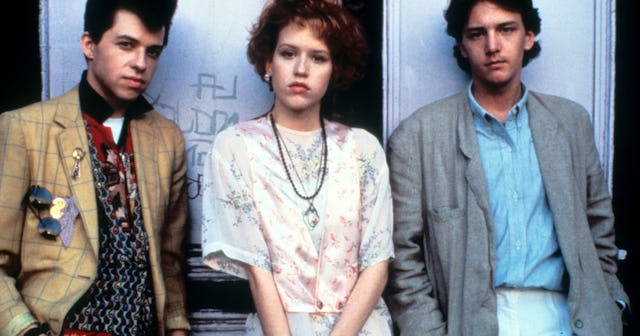Teen Movies Look So Much Different Now That I'm Watching From A Parent's Perspective

I crushed on my first love obsessively, thanks in part to Molly Ringwald. Growing up with older siblings, I received an early introduction to the Brat Pack, watching Pretty in Pink and Sixteen Candles more times than I should probably admit. I imagined myself as Samantha Baker, sitting on top of that magical table and getting kissed by Jake Ryan, candlelight glow illuminating his flawless complexion. I was an expert on teenage angst before I was a teen myself, and I studied the role fastidiously.
I was a student of love, and teen romance movies were my textbooks and lectures. I examined the wardrobes, the flirtatious one-liners, the well-timed blinks before a first kiss. These movie experiences were the perfect exercise in empathy: I took on the roles each time I watched. When the main character was left alone at the dance, my heart was crushed; when she finally got the guy, my spirits soared, too.
I didn’t just study Molly, though. I could recite nearly every word and replicate every horrifying dance move of Patrick Dempsey in Can’t Buy Me Love, so it’s no coincidence that the aforementioned first love had his own lawn-mowing business. It was too easy to picture myself riding off into the sunset on the back of his mower, stealing his well-worn hat to cover my uncontrollable honey-blonde locks.
While today’s fashion choices (and my still uncontrollable hair) say otherwise, it’s no longer the 1990s, and I’m no longer a high school student memorizing my crush’s schedule so I can “accidentally” find myself at his locker between classes. I didn’t marry one of the guys from Teen Beat magazine plastered on my bedroom walls or the boy from the lawnmower fantasy, but I did marry a heartthrob of my own, and now I watch these movies with my own teens.
I’ve introduced my 16-year-old son to some of my favorites (the ones that aren’t too cringy by today’s standards), and occasionally we try a more recent movie he’s seen mentioned on social media. Recently he suggested Spontaneous, a movie described by Wikipedia as an “American science fiction romantic black comedy film.”
I won’t give any spoilers, but I will say that every single one of those adjectives fits. (I will also say that we — teen and parents alike — all collectively hated the ending.) There was certainly a romantic storyline, one that teenage me would’ve reveled in — the stolen kisses, the dancing scene, the soundtrack that hit all of the right notes.
But something strange was happening inside me.
Instead of watching the scenes unfold through the eyes of the protagonist, I found myself watching with the eyes of a parent. Instead of swooning as the two teens shared a sweet dance in a barn, I wondered if her parents were worried that she wasn’t home yet. When other parents in the film received some tragic news about their child, I felt their grief in my core. It was such a strange sensation to be experiencing the same exercise in empathy, but this time for the adults on the screen. Sure, I’m over 40, but until recently when I’ve watched teen movies, I’ve walked in the faded Converse or dyed-to-match pumps of the teen girl falling in love, not the practical flats or sensible sneakers of the mother.
This might have happened because I was watching with my son, and I worried too much about making the most of every teaching opportunity. “I hope they’re using protection,” I whispered across the couch to my son during a more intimate scene. (I could see his rolled eyes, even in the dark.)
Some of this perspective-swapping may have happened because many of these teen movies today are more “real.” They address mental illness and suicide and the dark, twisty parts of adolescence. Sure, those topics were briefly addressed in my favorites like The Breakfast Club, but they didn’t feel so central to the storyline through my bright teenage eyes, focused mostly on John Bender’s sexy sneer. Now, through the crow’s feet of my mothering eyes, the darkness takes a front seat as I worry about my post-pandemic teenage sons, relearning to navigate an already-difficult world in an already-challenging stage of life.
But I don’t think it’s just the movies that have changed; I’ve changed, too. Becoming a mother made me more protective, more emotional. I worry more, too — about mistakes with real consequences, illnesses with no cures, heartbreaks without hope. I can’t watch without thinking of the young men sitting next to me, ready to take risks in relationships, explore more of the world, venture out away from the safety of our home. When I first watched my favorite Molly Ringwald films, I was the one ready to conquer the world; now I want to make sure the world is safe for my conquering teens.
Since this movie-watching transformation, I haven’t returned to the magical movies of my youth. I’m not ready to rewatch Sixteen Candles through the eyes of Brenda Baker, the stressed mother-of-the-bride who forgot her daughter’s birthday. And if I watch Can’t Buy Me Love from the parent’s perspective, will I find myself sympathizing with Cindy Mancini’s mom when her luxurious suede jacket is ruined? I certainly hope not. I still want to be on the back of that mower, where the endings are always happy and the stress is always low.
For now, though, I will continue to watch with my son, even if my perspective-switching has stolen a bit of the carefree joy for me. I will also try to watch without my sometimes-unwanted parental advice so I don’t steal the joy for him. Feeling tugs of sympathy for the helpless moms and dads, I’ll watch the on-screen parents, hoping that their kids, like my sons, will find their happily ever after. Or at least several memorable scenes with a made-for-the-moment soundtrack.